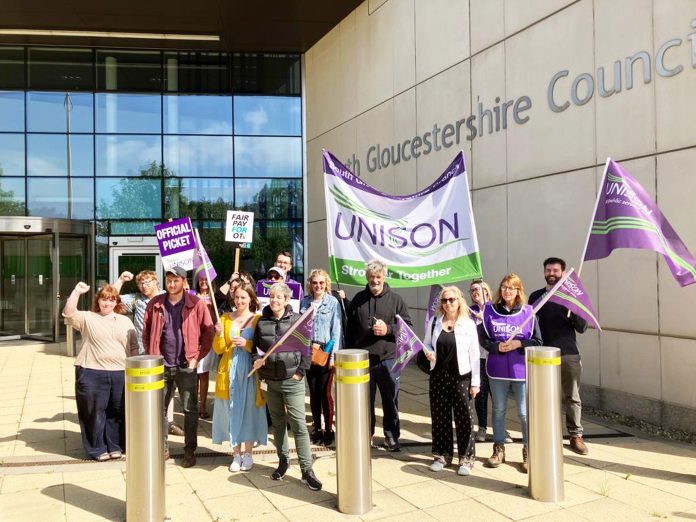Dan Smart, adult social worker and branch secretary, Unison South Gloucestershire (personal capacity)
With soaring workloads, massive understaffing and the ever-increasing demand for care, social workers are beginning to take a stand.
A grassroots movement in Unison is now well under way, with multiple strikes set to take place. Social workers in Brighton and Barnet branches have recently won emphatic mandates to strike, and have set out a programme including co-ordinated action on 7 November.
Swindon Council social workers in GMB have also been on strike recently over cuts to unsociable hours payments, and social workers in Leeds have reportedly just won their ballot and are setting strike dates. South Gloucestershire Council social workers and occupational therapists are still in dispute, after striking for six days over the summer, and may reballot if there is no satisfactory outcome from ongoing negotiations.
From around 60 council staff in South Gloucestershire, being the first group of social workers and occupational therapists to take action during the recent strike wave, this has now spread to at least five local authorities! Led by Socialist Party members in Unison, this shows the massive potential workers have.
The majority of the current disputes have been sparked by inequality between various social care departments when being paid retention payments. Retention payments are increasingly being used by councils across the country as a sticking plaster for the staffing crisis. However, they have mainly been implemented in children’s services, creating a two-tier workforce with adult social workers. This is despite adult staff having exactly the same qualifications and similarly dealing with some of the most challenging situations in society. We are one profession!
The divisive use of the payments has further angered workers who are struggling with the cost-of-living crisis. Many are being forced to leave for better-paid roles, for example in agency work where the pay can be three or four times that of local councils, for less stress. This then creates the knock-on problem of a lack of experienced council staff being able to pick up complex work and train newer staff.
The crisis in social care has gone on for far too long. The multitude of issues, including endless austerity and understaffing, have all had a devastating effect on the care and support people receive in their communities. Social workers go into the profession because we care about people, not the money, but when we’re prevented from being effective at doing this, the job just becomes demoralising.
A statement from Brighton and Hove Unison states: “A recent survey found that over half [of social workers] are considering quitting – unless we improve pay and conditions it is unlikely we are going to avert a disaster that is literally waiting to happen.”
Nevertheless, we can take optimism in the workers deciding to fight back. The burgeoning strike wave in social work is a tremendous step forward in tackling the issues of low pay and inequality in the sector. At a Unison social work seminar I attended last month, the enthusiasm for strike action was palpable, with many seeing the action going on in other branches and being eager to go back to their own workplaces and organise. Sections of striking social workers are already sharing experiences and speaking at each other’s events, recognising the importance of solidarity and seeking to build wider change.
This now has the potential for a movement to emerge which can not only win on pay demands but also go further. To fight for a properly funded, fully public-owned social care service. A service that can ensure everyone gets the support and dignity they deserve.








